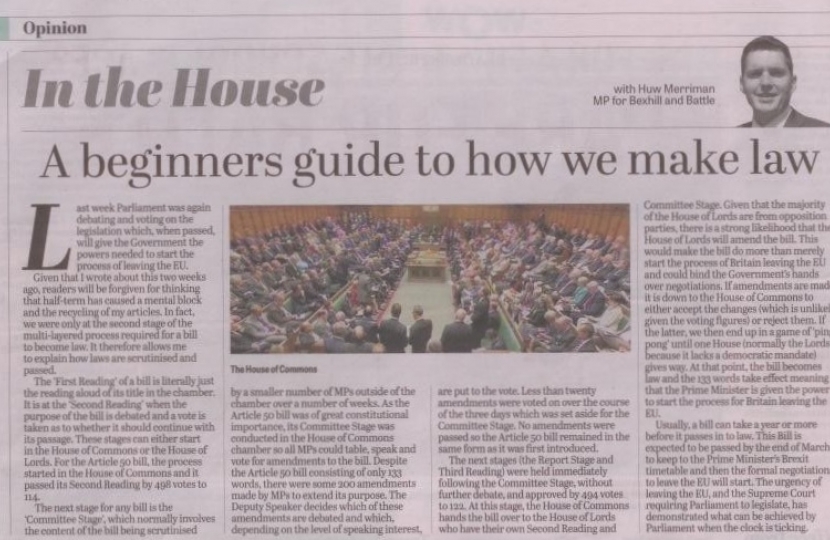
Last week Parliament was again debating and voting on the legislation which, when passed, will give the Government the powers needed to start the process of leaving the EU.
Given that I wrote about this two weeks ago, readers will be forgiven for thinking that half-term has caused a mental block and the recycling of my articles. In fact, we were only at the second stage of the multi-layered process required for a bill to become law. It therefore allows me to explain how laws are scrutinised and passed.
The 'First Reading' of a bill is literally just the reading aloud of its title in the chamber. It is at the 'Second Reading' when the purpose of the bill is debated and a vote is taken as to whether it should continue with its passage. These stages can either start in the House of Commons or the House of Lords. For the Article 50 bill, the process started in the House of Commons and it passed its Second Reading by 498 votes to 114.
The next stage for any bill is the 'Committee Stage', which normally involves the content of the bill being scrutinised by a smaller number of MPs outside of the chamber over a number of weeks. As the Article 50 bill was of great constitutional importance, its Committee Stage was conducted in the House of Commons chamber so all MPs could table, speak and vote for amendments to the bill. Despite the Article 50 bill consisting of only 133 words, there were some 200 amendments made by MPs to extend its purpose. The Deputy Speaker decides which of these amendments are debated and which, depending on the level of speaking interest, are put to the vote. Less than twenty amendments were voted on over the course of the three days which was set aside for the Committee Stage. No amendments were passed so the Article 50 bill remained in the same form as it was first introduced.
The next stages (the Report Stage and Third Reading) were held immediately following the Committee Stage, without further debate, and approved by 494 votes to 122. At this stage, the House of Commons hands the bill over to the House of Lords who have their own Second Reading and Committee Stage. Given that the majority of the House of Lords are from opposition parties, there is a strong likelihood that the House of Lords will amend the bill. This would make the bill do more than merely start the process of Britain leaving the EU and could bind the Government's hands over negotiations. If amendments are made, it is down to the House of Commons to either accept the changes (which is unlikely given the voting figures) or reject them. If the latter, we then end up in a game of 'ping-pong' until one House (normally the Lords because it lacks a democratic mandate) gives way. At that point, the bill becomes law and the 133 words take effect meaning that the Prime Minister is given the power to start the process for Britain leaving the EU.
Usually, a bill can take a year or more before it passes in to law. This Bill is expected to be passed by the end of March to keep to the Prime Minister's Brexit timetable and then the formal negotiations to leave the EU will start. The urgency of leaving the EU, and the Supreme Court requiring Parliament to legislate, has demonstrated what can be achieved by Parliament when the clock is ticking.


